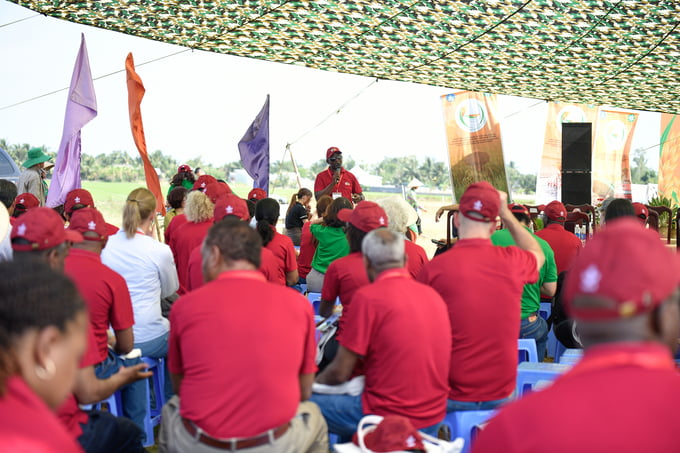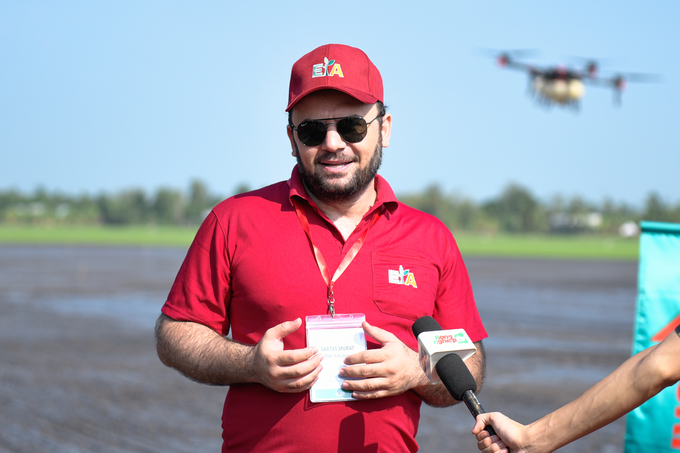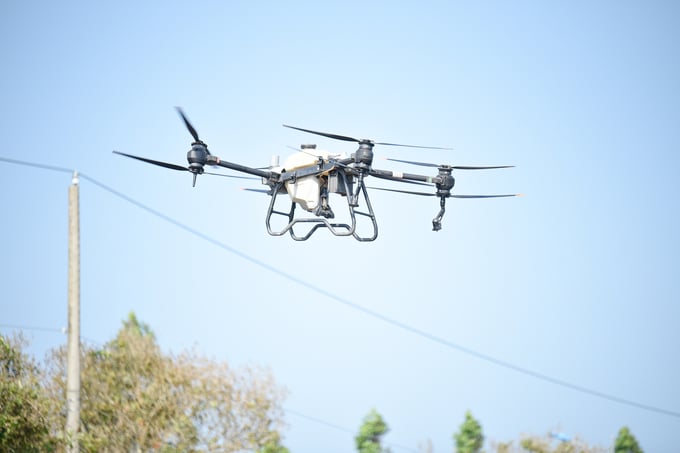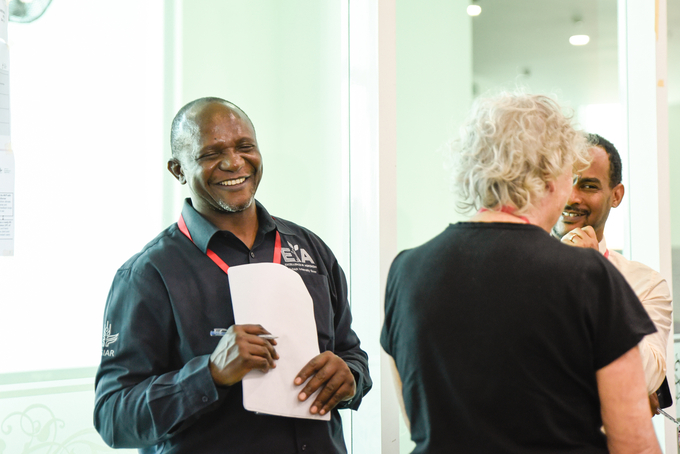May 30, 2025 | 15:30 GMT +7
May 30, 2025 | 15:30 GMT +7
Hotline: 0913.378.918
May 30, 2025 | 15:30 GMT +7
Hotline: 0913.378.918

At the Festival, international scientists convened in Hau Giang to witness firsthand demonstrations of cutting-edge technology and engineering applications in rice cultivation.
CGIAR (the Consultative Group on International Agricultural Research) is the world’s largest agricultural innovation network. Comprising 14 Research Centers and one Intergovernmental Research Center (AfricaRice), CGIAR has been at the forefront of the Excellence in Agronomy (EiA) initiative since 2020. This initiative is designed to support smallholder farmers in navigating the complexities of global climate change and maintaining a balanced livelihood. Annually, agricultural innovation scientists select a country to review CGIAR projects.
In conjunction with the International Festival of Vietnam Rice Industry - Hau Giang 2023, 91 experts from across the globe visited the Mekong Delta. Drawing on their extensive experience and playing a coordinating role between farmers, policymakers, and United Nations agencies, CGIAR chose to engage in Vietnam, expressing its commitment to supporting the government in rice development and sustainable agriculture.
Ms. Barbra Muzata, Global Communications Lead of CGIAR, shared her perspective: “The invitation from the Ministry of Agriculture and Rural Development to participate in the Launching Ceremony of the One Million Hectare of High-quality Rice Program is a tremendous honor for CGIAR. We highly value our collaboration with our Vietnamese friends.
We are eager to immerse ourselves in the rice production business in solidarity with the Ministry to see what our collaborative efforts have enabled us to do so that we become part of the launch. Soon, we will learn from a demonstration of the mechanized sowing process and the circular economy model based on rice straw in the Mekong Delta region. Our presence here reflects our commitment to learning at the highest level. We hope the Ministry of Agriculture and Rural Development will recognize CGIAR’s collaborative efforts in Vietnam over the years and join us in transferring technology to other countries.”
The Excellence in Agronomy Initiative sets ambitious targets to enhance farmers’ productivity and profitability by 2030, foster soil health, and assist smallholder farmers in resource management and smart farming practices. Aligning with the goals of the Vietnam-Africa Policy Dialogue Workshop, the organization’s mission to advance agriculture provides a multi-dimensional perspective on transforming the global food system.
The event showcased mechanized sowing technology and the circular agriculture model using straw, highlighting advancements and innovations in rice production and cultivation within the Mekong Delta region. This live demonstration allowed international researchers to comprehend real-world conditions and engage in discussions with Vietnamese experts.
A standout feature of the exhibition was the utilization of drones in agriculture. Eight drones, sourced from various suppliers in Vietnam and equipped with advanced technology, graced the field to welcome the attending delegates, showcasing their versatility in meeting diverse agricultural needs.
Expressing his enthusiasm, Dr. Murat Sartas, a Turkish scientist living and working in Rwanda, said, “I am very happy to be here in Hau Giang, watching the field demonstration. You are a success story of positive transformation. We thank the organizers for the invitation to attend this technological demonstration! It’s great to be here. The question is how we can scale these beautiful things in other countries.”
Mr. Murat’s main fields are innovation, expanding agricultural models, and multilateral cooperation. Dr. Murat’s role in the CGIAR-EiA organization is to advise localities to bring technology to the community.

Dr. Murat Sartas, an expert on innovation in agriculture.
Dr. Mudereri Tawona, a Zimbabwean potato expert, also expressed satisfaction with the drone applications showcased in agriculture, expressing his hope that his country can soon adopt this technology to safeguard the health of farmers.
He conveyed: “I think there is limited availability of these technologies in my country as well as in Rwanda, where I work. It’s an opportunity to see what is happening here in Vietnam and how we can take some of this technology to improve rice production, particularly mechanization to reduce manual labor and use these technologies and these machines to provide efficiency and better production. I think the best opportunity that we have is for our governments to collaborate in the South-South collaboration and to work together with private companies – this will be a win-win situation for all.”
The African agricultural sector faces numerous challenges, including low productivity due to limited access to quality inputs, outdated farming methods, and underdeveloped infrastructure. Climate change causes crop failures, threatening food supplies in the region. Post-harvest losses, transportation, and difficulties in market access are also barriers to the agricultural economy.
International scientists acknowledge Vietnam’s status as an advanced nation in rice cultivation, boasting exceptional technological capabilities, a well-qualified workforce, and abundant capital. They hope that Vietnam can extend its cooperation with governments, private sectors, and international organizations, sharing these technologies with African countries.

The highlight of the show was the demonstration of drones used in agriculture.
Delving into the discussion of the South-South cooperation model to drive food system transformation in Africa, Mandla Nkomo, Work Package Lead and Chief Growth Officer for the CGIAR-EiA Initiative, highlighted the shared challenges faced in Africa. Many experts, including young scientists, see an opportunity to transform the system.
The Excellence in Agronomy Initiative (EiA), comprising 15 member institutes, has garnered attention and investment from international organizations. With a core mission of assisting smallholder farmers in adapting to global climate change, EiA outlines promising roadmaps for Africa to develop sustainable agriculture, contributing to economic growth. EiA aims to increase productivity and profitability for farmers by 2030, enhance soil health, and mitigate climate impacts.
Dr. Nkomo elaborates on agronomy, stating, “We don’t focus too much on research or technology development. CGIAR member institutes have excelled in fulfilling that role. The Agronomy Excellence Initiative prioritizes improving farmer knowledge, placing farmers at the center of the entire rice value chain development process.”
A noteworthy example is the Sustainable Rice Platform (SRP), which advocates for resource efficiency and climate change resilience in rice systems, from farm to market. The SRP initiative supports project countries in reshaping the rice market, and establishing standards, indicators, and incentives. CGIAR advocates for sustainable production by promoting the widespread adoption of advanced, best-in-class sustainable technologies throughout the rice value chain.

Mandla Nkomo, Work Package Lead and Chief Growth Officer for the CGIAR-EiA Initiative.
Senegal stands out as a success story. In just a few years, the SRP project, in collaboration with CGIAR experts, has imparted training on sustainable rice cultivation methods and effective fertilization to 575 farmers, including 162 women (2021 report).
Projects like these carve an essential path for transforming the global rice industry, contributing to the United Nations Sustainable Development Goals and national climate change targets. The Director of EiA emphasizes the pivotal role of policy in transferring technology from one country to another, fostering equal development.
“It is recognized that when Vietnam initially developed its rice industry, it heavily relied on rice varieties from IRRI and engaged in technology exchanges with other countries. CGIAR and AfricaRice examine the success story of your country. Vietnam’s willingness to share has, in part, provided answers to significant questions for us,” expresses Mr. Nkomo with appreciation.
Translated by Quynh Chi

(VAN) Several scientists and farmers are experimenting with soil treatment in some key durian-growing regions such as Cai Lay (Tien Giang), Dak Song, Gia Nghia, and Dak R’lap (Dak Nong).
/2025/05/25/4127-3-073637_820.jpg)
(VAN) Thanks to the promotion from an FAO-implemented project, vegetable production in greenhouses in Moc Chau has seen strong development, from 1.5 hectares in 2021 to nearly 50 hectares in 2024.

(VAN) FAO has recently supported USD 140,000 to implement the project 'Risk mitigation human-animal interface risks through disease control initiatives in pig farming.'

(VAN) The People's Committee of Tra Vinh province has approved an adjustment to the investment policy for the Green Hydrogen Plant project, increasing its area to approximately 52.76 hectares.
![Reducing emissions from rice fields: [2] Farmers’ commitment to the soil](https://t.ex-cdn.com/nongnghiepmoitruong.vn/608w/files/news/2025/05/05/dsc08881jpg-nongnghiep-140632.jpg)
(VAN) Clean rice cultivation model in Thuong Tan commune, Bac Tan Uyen district, is assisting local residents in achieving sustainable agriculture by substantially reducing costs, increasing productivity, and protecting the environment.

(VAN) At the conference to disseminate Resolution No. 68, AgriS introduced its digital agricultural ecosystem and reaffirmed its commitment to accompanying the Government in promoting private sector development and sustainable agriculture.

(VAN) 'Blue Ocean - Blue Foods' initiative is designed to restore marine ecosystems and establish sustainable livelihoods for local communities by cultivating a minimum of 1,000 hectares of cottonii seaweed in the first three years.